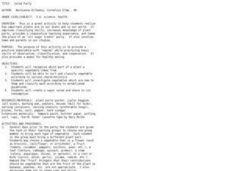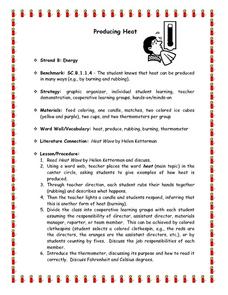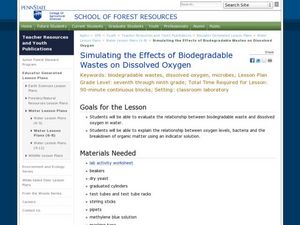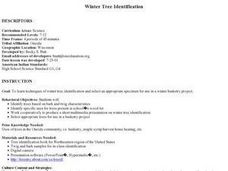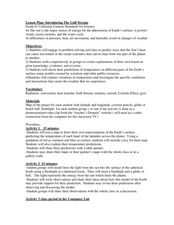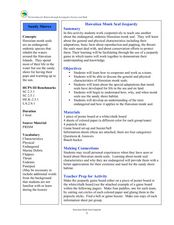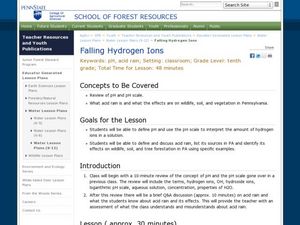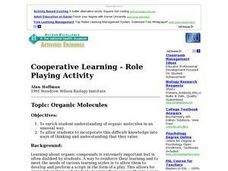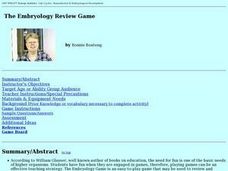Curated OER
Vegetable Party
Students classify vegetables and eat them as a salad. In this multi-disciplinary science and health activity, students bring various vegetables to school and classify them in several different ways. Then with parent helpers, the students...
Curated OER
Scientific Methods and Inquiry Skills
Fifth graders conduct a mystery bag experiment and use the scientific method and inquiry skills to solve the mystery. They discuss how to make scientific "guesses," and in small groups use their five senses to try and figure out what...
Curated OER
Forms of Energy
Students, working in expert groups, study a form of energy. They plan a slide show presentation using pictures, clip art, and student taken digital pictures that show the energy type they have become experts in. They use a planning sheet...
Curated OER
Producing Heat
Students listen to "Heat Wave" by Helen Ketterman and discuss the story by creating a word web with heat as the main topic. They break into groups and conduct an experiment using a thermometer to record the temperature of melting ice...
Curated OER
How We Impact the Earth
Students work in cooperative learning groups to create PowerPoint or KeyNote presentations on how humans impact the earth. This lesson can be accomplished in three different parts.
Curated OER
Molecular Modeling Activity
Young scholars explore the concept of molecular modeling and differentiate between saturated and unsaturated compounds. In small groups, they identify molecular formulas, complete a chart comparing alkanes, alkenes, and alkynes, and...
Curated OER
Changes in Matter
Eighth graders, in groups, explain the difference between physical and chemical changes.
Curated OER
Aviation
Students explore aviation. In this physics instructional activity, students work cooperatively to construct kites, paper airplanes, and paper plate discs. Students launch the object created and observe characteristics and length of...
Curated OER
Fish Fact Rummy
Seventh graders study and explore the base of PA game fish species and characteristics. In this cooperative learning instructional activity students create a fish fact game by researching information on certain species then play...
Curated OER
Simulating the Effects of Biodegradable Wastes on Dissolved Oxygen
Students evaluate the relationship between biodegradable waste and dissolved oxygen in water. In this biodegradable wastes lesson students complete a lab activity in groups then analyze their results.
Curated OER
Winter Tree Identification
Young scholars utilize techniques of winter tree identification such as twig and bark characteristics. Students also identify specific uses for trees in school surrounding. They work cooperatively to produce a multimedia presentation...
Curated OER
The Earth is Tilted, What Does that Mean?
Middle schoolers examine the tilt in the Earth's revolution around the sun. Using that information, they draw a picture and label the indirect and direct rays of the sun. In groups, they answer discussion questions and complete an...
Curated OER
Coral Reef Ecology
Students explore coral life cycles. In this coral ecosystems lesson, students view videos explaining the life cycle of coral, including examples of sexual and asexual reproduction. Students read a related article cooperatively in groups,...
Curated OER
Introducing The Gulf Stream
Sixth graders research the average temperatures of different places on Earth. In this earth science lesson plan, 6th graders explain how the sun's heat cause ocean movement. They discuss how temperature change affects the weather we...
Curated OER
Hawaiian Monk Seal Jeopardy
Students explore the Hawaiian monk seal. In this science lesson, students read about the monk seal and participate in a game in which they answer questions about the Hawaiian monk seal.
Curated OER
Disorders of the Brain
Students, in groups, conduct research about a specific disorder of the brain, create a character study of a person with that brain disorder, and then present the information to the rest of the class.
Curated OER
Falling Hydrogen Ions
Tenth graders define pH and use it to interpret amounts of hydrogen ions in a solution. In this hydrogen lesson plan students read about acid rain, divide into groups and present their information to the class.
Curated OER
The Desert Biome
Students create a visual presentation of the characteristics of a biome. Working in small groups, students use traditional and online resources to gather data concerning biomes. Students use their information to create a bulletin board...
Curated OER
Understanding the Effects of Water Pollution
Third graders examine the effects of water pollution by participating in a story. After reading the story, they determine the best way to get rid of the pollution in a river using different objects. In groups, they complete a worksheet...
Curated OER
Organci Molecules
Students explore organic molecules in an unusual way. This allows students to incorporate this difficult knowledge into ways of thinking and exploring that they value. Students are placed in groups of four, with the attempt to include...
Curated OER
What are Mammals?
Pupils differentiate between wild and tame animals, explain how to classify mammals into groups based on common charactertistics and comprehend the values of zoos. They listen as the teacher reads Psalm 50:10 and explains that all of the...
Curated OER
The Embryology Review Game
Students create a game that may be used to review and reinforce embryological terminology and concepts. They create a game board and question cards while promoting cooperative learning.
Curated OER
Enzyme Activity: An Inquiry Based Approach
Using an inquiry approach to studying biochemical reactions, cooperative teams of students investigate hypotheses about living materials that contain enzymes which break down in hydrogen peroxide. They perform experiments, practice...
Curated OER
Background Reading and Coral Dramas
Learners create a dramatic play. In this coral instructional activity, students explore the anatomy of coral. Working in groups, learners research the form and function of coral and present a skit to represent their learning.
